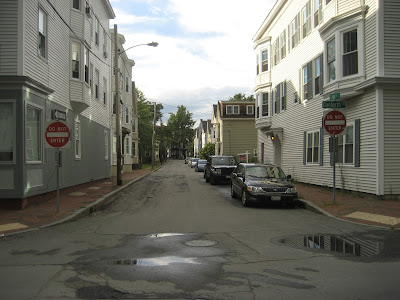The City of Portland's "technical manual" spells out precise engineering standards for the city's streets: they need to have two 14' travel lanes, 6 feet of grass on either side, and 5' sidewalks. These standards were spelled out decades ago, when automotive travel was the top priority in street design. Freeways use 14 foot lanes, but most of the city's historic streets have 10' lanes. The extra width lets motorists speed through neighborhoods with a minimum of attention paid to their surroundings.
This, thankfully, is finally being reviewed for changes in accordance with the city's new "complete streets" resolution. And a good thing, too, because a number of the city's best neighborhood streets are completely illegal according to the old standard. With new, more flexible rules in place, the city might gain more great places like these:
Tate Street, West End:
Summer Street, West End:
Dermot Court, West End:
May Street, West End:
Maple Street, downtown:
South Street, downtown:
Oak Street, downtown:
Casco Street, downtown:
Locust Street, East End:










 Learn more, and find out where you can purchase a copy.
Learn more, and find out where you can purchase a copy.